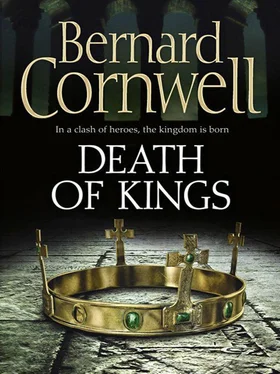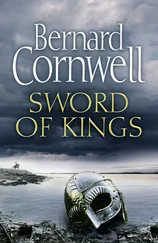‘I don’t know, lord. A lot.’
‘He sent messengers to other lords?’ I asked.
‘To his thegns, lord. He sent me. I’m supposed to bring him men.’
‘And you found me instead,’ Edward said warmly.
‘He’s raising an army,’ I said.
‘The fyrd,’ Steapa said scornfully.
Æthelwold was doing what he thought wise, but he had no wisdom. He had inherited wide estates from his father, and Alfred had been foolish enough to leave those estates untouched, and now Æthelwold was demanding that his tenants come with weapons to make an army that he presumably believed would march on Wintanceaster. But the army would be the fyrd, the citizen army, the labourers and carpenters and thatchers and ploughmen, while Edward had his royal bodyguard, who were all trained warriors. The fyrd was good for defending a burh, or for impressing an enemy with numbers, but to fight, to face a sword-Dane or a raving Northman, a warrior was needed. What Æthelwold should have done was stay in Wintanceaster, murder all Alfred’s children, and then raise his standard, but like a fool he had gone to his own home and now we rode there with warriors.
The day was dying as we neared Wimburnan, the sun was low in the west and the shadows long on the rich slopes where Æthelwold’s sheep and cattle had their grazing. We came from the east and no one tried to prevent us reaching the small town that lay cradled between two rivers that joined close to where a stone church loomed above the shadowed thatch of the roofs. King Æthelred, Alfred’s brother and Æthelwold’s father, lay buried in that church, and beyond it, and surrounded by a tall palisade, was Æthelwold’s hall where a great flag flew. It showed a prancing white stag with fierce eyes and two Christian crosses for antlers, and the low sun was catching the linen that was spread by a small wind and the banner’s dark red field seemed to smoulder like boiling blood in the late daylight.
We rode north around the town, crossing the smaller river and then climbing a shallow slope that led to one of those forts that the ancient people had built all across Britain. This fort had been hacked out of a chalk hilltop, and Father Edmund told me it was called Baddan Byrig and that the local people believed the devil danced there on winter nights. It had three walls of heaped chalk, all overgrown with grass, and two intricate entrances where sheep grazed, and it overlooked the road that Æthelwold must take if he wanted to go north to his Danish friends. Edward’s first instinct had been to block the road to Wintanceaster, but that town was protected by its walls and garrison and I persuaded him that the greater danger was that Æthelwold would escape Wessex altogether.
Our army spread along the skyline beneath its royal banners. Wimburnan lay just a couple of miles south and east of us and we must have looked formidable to anyone watching from the town. We were sunlit by the low rays that reflected the glint of our mail and weapons and that made the bare chalk patches of Baddan Byrig’s walls glow white. That low sun made it difficult to see what was happening in the small town, but I glimpsed men and horses by Æthelwold’s hall and could see people gathered in the streets, yet there was no shield wall defending the road that led to that great hall. ‘How many men does he have?’ Edward asked. He had asked that question a dozen times since we had met Father Edmund, and a dozen times he had been told we did not know, that no one knew, and that it might be forty men or it might be four hundred.
‘Not enough men, lord,’ I said now.
‘What…’ he began, then abruptly checked. He had been about to ask what we should do, then had remembered that he was the king, and was supposed to supply the answer himself.
‘Do you want him dead or alive?’ I asked.
He looked at me. He knew he must make decisions, but did not know what decision to make. Father Coenwulf, who had been his tutor, began to offer advice, but Edward cut him short with a wave of his hand. ‘I want him to stand trial,’ he said.
‘Remember what I told you,’ I said. ‘Your father could have saved us a lot of trouble by just killing Æthelwold, so why don’t you let me go and slaughter the bastard?’
‘Or let me, lord,’ Steapa volunteered.
‘He must stand trial before the Witan,’ Edward decided. ‘I do not wish to begin my reign with slaughter.’
‘Amen and God be praised,’ Father Coenwulf said.
I gazed into the valley. If Æthelwold had raised any kind of army, it was not in evidence. All I could see was a handful of horses and an undisciplined rabble. ‘Just let me kill him, lord,’ I said, ‘and the problem will be solved by sundown.’
‘Let me talk to him,’ Father Coenwulf urged.
‘Reason with him,’ Edward said to the priest.
‘Do you reason with a cornered rat?’ I demanded.
Edward ignored that. ‘Tell him he must surrender to our mercy,’ he told Father Coenwulf.
‘And suppose he decides to kill Father Coenwulf instead, lord King?’ I asked.
‘I am in God’s hands,’ Coenwulf said.
‘You’d be better in Lord Uhtred’s hands,’ Steapa growled.
The sun was just above the horizon now, a dazzling red globe suspended in the autumn sky. Edward looked confused, but still wanted to appear decisive. ‘The three of you will go,’ he announced firmly, ‘and Father Coenwulf will do the talking.’
Father Coenwulf lectured me as we rode downhill. I was not to threaten anyone, I was not to speak unless spoken to, I was not to touch my sword, and the Lady Æthelflaed, he insisted, was to be escorted back to her husband’s protection. Father Coenwulf was pale-skinned and stern, one of those rigid men that Alfred had loved to appoint as tutors or counsellors. He was clever, of course, all Alfred’s favoured priests were sharp-witted, but all too ready to condemn sin or, indeed, to define it, which meant he disapproved of me and of Æthelflaed. ‘Do you understand me?’ he demanded as we reached the road, which was little more than a rutted track between untrimmed hedges. Wagtails flocked in the fields and far off, beyond the town, a great cloud of starlings wheeled and faded in the sky.
‘I’m not to threaten anyone,’ I said cheerfully, ‘not to speak to anyone and not to touch my sword. Wouldn’t it be easier if I just stopped breathing?’
‘And we shall restore the Lady Æthelflaed to her proper place,’ Coenwulf said firmly.
‘What is her proper place?’ I asked.
‘Her husband will decide that.’
‘But he wants her in a nunnery,’ I pointed out.
‘If that is her husband’s decision, Lord Uhtred,’ Coenwulf said, ‘then that is her fate.’
‘I think you’ll learn,’ I said mildly, ‘that the lady has a mind of her own. She might not do what any man wants.’
‘She will obey her husband,’ Coenwulf insisted and I just laughed at him, which annoyed him. Poor Steapa looked confused.
There were half a dozen armed men at the outskirts of the town, but they made no attempt to stop us. There was no wall, this was no burh, and we plunged straight into a street that smelt of dung and woodsmoke. The folk in the town were worried, and silent. They watched us, and some made the sign of the cross as we passed. The sun had gone now, it was twilight. We skirted a comfortable-looking tavern, and a man sitting with a horn of ale raised it to us as we rode past. I noted that few men had weapons. If Æthelwold could not raise the fyrd in his own home town, then how could he hope to raise the county against Edward? The gate to Saint Cuthberga’s nunnery opened a crack as we came near and I saw a woman peer out, and then the gate slammed shut. There were more guards at the door to the church, but again they made no effort to stop us. They just watched us pass, their faces sullen. ‘He’s already lost,’ I said.
Читать дальше
Конец ознакомительного отрывка
Купить книгу












